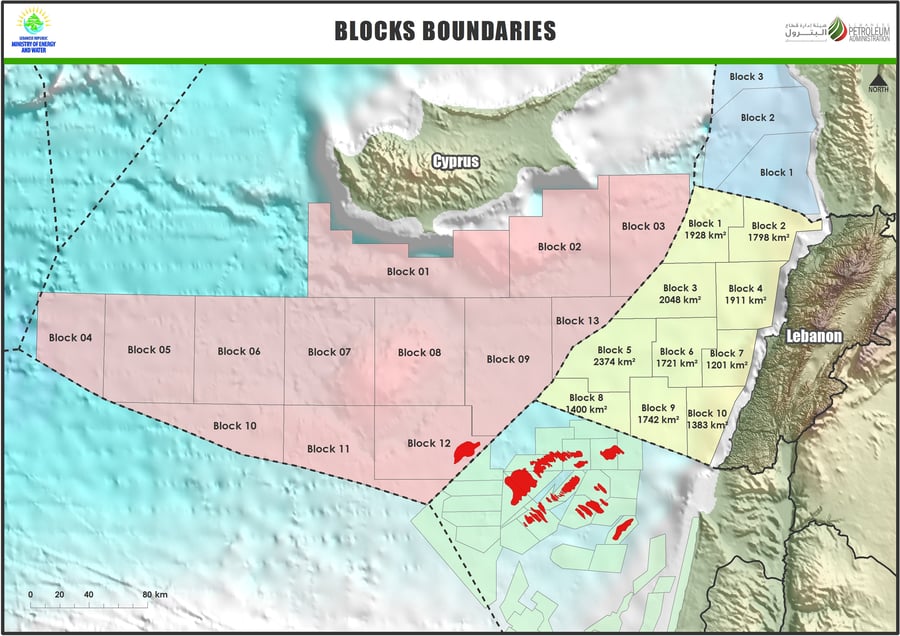About two months before the expiry of the first exploration deadline, Russian “Novatek” company sent a letter to the Lebanese Ministry of Energy informing it of its withdrawal from the consortium of companies undertaking oil activities in Blocks 4 and 9 in Lebanese marine waters, and that it no longer wanted to continue its contractual obligations within its 20 percent stake in the contract.
In 2018, Lebanon signed its first oil and gas exploration and production contracts in two concession areas in Blocks 4 and 9, with a consortium that includes France’s Total Energies, Italy’s Eni, and Russia’s Novatek.
According to the contract, the French company will lead the alliance, and it will operate the project, in which it has a 40% stake, compared to 40% for Eni and 20% for Novatek.
And in the year 2020, the exploration work stopped after the failure to find commercial quantities in Block No. 4, in light of a border dispute with Israel, and where the United States is mediating between the two parties to reach a settlement on it.
Block No. 4 is located off the shores of Kesrouan in Mount Lebanon, while Block No. 9 carries significant sensitivities as it is located in southern Lebanon and is part of the border dispute between Lebanon and Israel. Lebanon says that this block is located within its territorial and economic waters, while Israel claims that it has the right to a part of this area.
Sources in the Lebanese Ministry of Energy say that Novatek justified its move by saying that the US sanctions imposed on Russia had a negative impact on it, and that it was no longer able to make any financial transfers outside Russia. This is logical, especially since Novatek’s role in the alliance is one of an investment partner, not a technical one.
Commenting on the Russian company’s decision, Lebanese Energy Minister Walid Fayyad announced that despite being informed of the decision to withdraw and the Lebanese Petroleum Administration (LPA), this notification guarantees the procedures for preserving the two existing agreements between the Lebanese state and the other right holders, including the operator. He pointed out that the operator, i.e. Total, will carry out the petroleum activities in Block 9 in accordance with the exploration plan approved by the Minister based on the opinion of the Petroleum Administration.
Does this carry implications?
The Russian company’s decision to withdraw raised many questions about the dimensions of this procedure, and concerns that it would affect exploration operations.
Could the latest decision have been taken after consultations between the three companies took place, in light of the pressures the Russian company is facing from the United States due to the Russian-American war, so that “Total” and “Eni” can continue the work required of them?
Or was there a “settlement” between the three companies, fearing that Total and Eni would be subject to US sanctions because of their dealings with the Russian company? This is highly probable, especially since Total and Eni sent books of similar content to the Ministry of Energy following the Novatek book, in which they confirmed that they would continue their contractual obligations regarding exploration in blocks 4 and 9, and that they are ready to discuss the rights of others in the coalition.
Will this withdrawal of “Novatek” open the door to the start of the exploration work, where “Total” undertakes the exploration process, while the task of “Eni” is in the context of extraction? Will we soon see another country seeking to replace the Russian company?
It’s worth mentioning that “Total” is currently under pressure from the French government, which is asking it to clarify whether it is “involved” in supplying the Russian army with fuel for combat aircraft within the framework of a joint local project. Despite the criticism, Total maintains its assets in Russia, unlike its main Western competitors. It says it has not operated infrastructure that would have fueled the Russian military and has no knowledge that its trading partners might be producing any jet fuel.
American mediator
Novatek’s decision comes at a time when negotiations are underway indirectly between Lebanon and Israel to demarcate the maritime borders through the American mediator, Hamus Hochstein, who is expected to be in Lebanon next week to inform the Lebanese side of Israel’s response to Beirut’s demands in order to reach a demarcation of the maritime border.
On June 6, Israel brought in a ship to extract gas from the disputed Karish field. Lebanon quickly requested the mediation of the United States, as Washington immediately dispatched an energy expert, Amos Hochstein.
There is great reliance that the expected revenues from the extraction of gas in Lebanon can help it overcome its severe financial crisis.
On the 3rd of June, the Secretary-General of the Association of Banks in Lebanon, Fadi Khalaf, issued a statement calling for the transfer of 20% of any future oil and gas revenues to a special fund to repay the funds of disappeared depositors.
But the Triangle Foundation, which specializes in monitoring policy-making, research, and media, said in a study that what the political and financial elite in Lebanon are calling for is to “count the chicks before the eggs hatch,” that is, to make money from unproven reserves, which is a dangerous game. It added, “While there is some evidence of hydrocarbon reserves, so far no commercially viable quantities have been found. The ocean floor will continue to hide its wealth until oil and gas companies continue to explore, perhaps one day in Lebanese waters.”
Lebanese officials reiterated their call for Total to resume drilling in Lebanese economic waters. Information spread about two weeks ago that a team from the French company booked 150 rooms in Beirut hotels next November, in order to start work. Will the year 2023 be a positive year for Lebanon?








